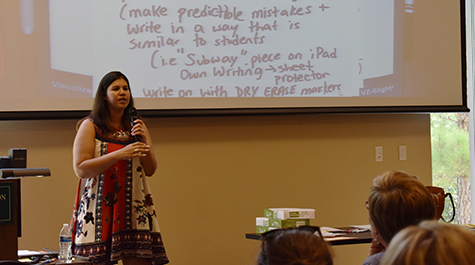Summer Literacy Institute brings teachers from near and far
As the school year started back up across the country and teachers dust off their grade books, the Summer Literacy Institute helped teachers prepare for working with aspiring writers from kindergarten through eighth grade. Teachers from local cities and counties to cross-country classrooms came to the School of Education to learn how to help their students learn the ins and outs of writing.
Now in its fourth year since its creation by Denise Johnson, associate dean and professor in the School of Education and the director of the program, the Summer Literacy Institute covered everything from writing workshops to understanding the link between reading standards and writing standards. Literacy experts spent four days working with teachers to help them bring best practices back to their classrooms.
Making Writing Make Sense
Meredith Alvaro, a national literacy consultant from the metro New York and New Jersey area, presented on how to effectively use the writing workshop as a tool to help K-5 students write. “A lot of teachers were not taught to write through instruction, but instead went through the assignment-grade cycle, where they only received assignments and grades with no input on how to improve,” she said. “Without the instructional component, there’s a big divide between stragglers and successful writers."
She added, “Writing is a difficult area for Virginia teachers, because the only state assessment students undergo is in grade 8. It’s difficult to get kids better at reading without also working on writing.”
Her presentations encouraged progress, not perfection, and emphasized that some students learn by seeing a final project, while others need guidance on what steps to take to get there. She also discussed how to help students get more out of reading out loud and understand what the teacher is trying to share with them.
Nicole Wagner, a 5th grade teacher at Waller Mill Elementary School in York County, VA, appreciated both the location and the message she heard. “I loved that William & Mary is close to home and has a good reputation,” she said. She believed she would be able to better integrate reading and writing with her students as a result of the presentations she attended. When asked what benefits she thought her students would see, she said “Comprehension — they’ll get more with integration between reading and writing!”
Literary Specialist with Local Roots
Beth Estill is well-known to many in the community as a longtime literacy specialist in Virginia Beach public schools. She offered tried-and-true advice about how to link reading and writing standards in a way that makes sense to both students and teachers. She also explained how the writing standards for narrative text, nonfiction, expository writing, research, opinion and persuasive writing interact.
Her message that “better readers are better writers because they borrow words” resonated with her audience. “I loved the way she explains things and makes it applicable to everything,” shared Pat Koscinski, an assistant elementary school principal in Prince William County. “I’m excited to take this back and assess with our teachers.”
Estill also discussed how students learn words as they develop, and how different students acquire various language abilities at different rates. “We’re working on more emphasis on vocabulary and how to integrate that into the classroom,” said Koscinski. “This will help our teachers meet their students where they’re at.”
